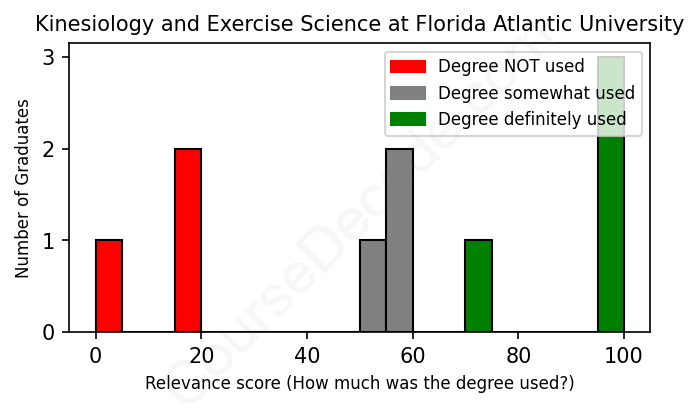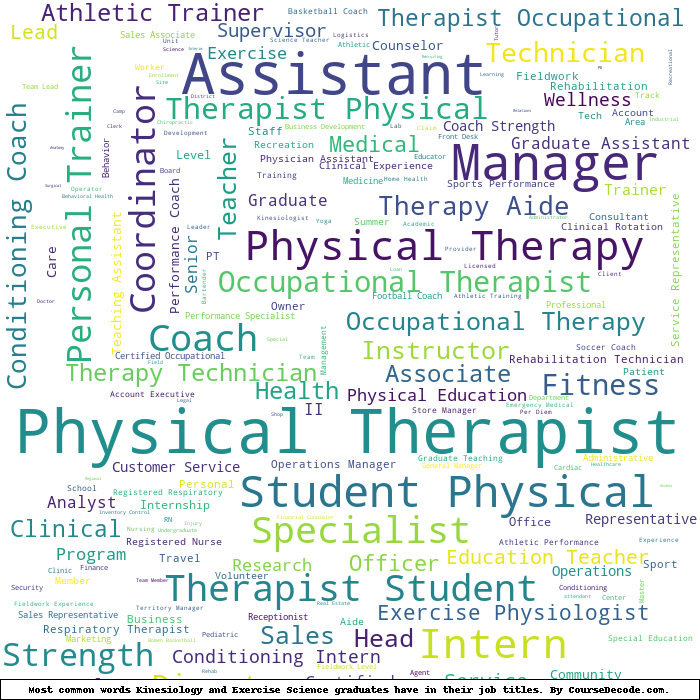
First, some facts. Of the Kinesiology and Exercise Science graduates from Florida Atlantic University we've analyzed , here's how many have used (or NOT used) their degree in their career:

These are estimates based on AI analysis of 10 LinkedIn profiles (see below).
The verdict? Significantly below average. Overall, with an average relevance score of 56%, Kinesiology and Exercise Science graduates from Florida Atlantic University have a much lower likelihood (-11%) of finding work in this field compared to the average graduate across all fields:
And for comparison, here's the chart for all profiles we've looked at across all degrees.
Also, after graduating, 50% of these graduates have pursued further education other than another Bachelor's degree (such as a Masters degree or other), compared to the average across all profiles of 35%. This suggests you may need more than just a Bachelors degree to be competitive as a Kinesiology and Exercise Science graduate.
See the details:
|
Relevance score: 100% We think this person has gone into a career highly relevant to their degree. We think this person has gone into a career highly relevant to their degree.
DEGREE INFOGraduated in 2016 from Florida Atlantic University with a Bachelor's degree in Kinesiology and Exercise Science. No other secondary education since. JOB HISTORY SINCE GRADUATIONIndependent Business Owner Nacho Stretch Therapy Jun 2019 - Present ABOUTA weightlifting martial artist who has taken his passion for human performance and establishing an emphasis for muscle maintenance and recovery work. |
The top 10 most common jobs done by the graduates we've analyzed (ranked most common to least) are:
After analyzing job profiles of graduates from Florida Atlantic University with degrees in Kinesiology and Exercise Science, it seems like many of them have gravitated towards roles in healthcare, particularly nursing and therapy-related positions. Jobs like Registered Nurse, Occupational Therapist, and Physical Therapy Technician stand out because they directly apply knowledge from their studies, involving an understanding of human movement, rehabilitation techniques, and anatomical principles. These positions make a strong connection to Kinesiology and Exercise Science because they require that foundational knowledge to help patients improve their physical health.
However, not all career paths taken by Kinesiology graduates are relevant to their field of study. Many have moved into unrelated areas like web development, real estate, or hospitality, where the skills from their degree seem pretty irrelevant. For example, roles like Web Programmer or Social Media Professional focus on technical or marketing skills that don’t utilize much of the exercise science knowledge they earned. While it's great that graduates are finding diverse opportunities, it appears that a good chunk of them may not be fully utilizing the specific expertise gained from their degree, which is a bummer for a field that can have such a significant impact on health and wellness.
Here is a visual representation of the most common words in job titles for Kinesiology and Exercise Science graduates (this is across all Kinesiology and Exercise Science graduates we've analyzed, not just those who went to Florida Atlantic University):

Looking at the career paths of graduates from Florida Atlantic University’s Kinesiology and Exercise Science program, it seems like their initial jobs right after graduation tend to vary widely. Many start in roles related to health and fitness, such as personal trainers or physical therapy technicians, while some pivot into completely different fields like nursing, IT, or even real estate. It’s interesting to note that while some graduates land positions in related areas such as strength and conditioning coaching or massage therapy, others take a turn toward professions that seem less connected to their studies, like social media management or web development. This might indicate a blend of passion and practicality — some graduates are leveraging their degree directly, while others seek out opportunities that may not align perfectly with their major.
Fast forward five to ten years, and the trends seem to normalize a bit more. A decent number of graduates find stable roles in healthcare, especially nursing positions, suggesting that many Kinesiology graduates pivot into nursing, likely due to the overlapping skills in patient care and exercise physiology. Others who maintained the path closer to their degree have ventured into entrepreneurship, establishing their own fitness or therapy businesses. However, it’s clear that not everyone sticks to the Kinesiology route long-term; some have wholeheartedly switched gears into entirely different industries. Overall, while there are successful pathways directly related to Kinesiology and Exercise Science, there’s also a significant number pursuing diverse careers, showing that this degree can offer a lot of flexibility, even if it doesn’t always lead directly into the field associated with it.
Honestly, a Bachelor’s degree in Kinesiology and Exercise Science can be a mixed bag in terms of difficulty. At Florida Atlantic University, it typically involves a solid mix of coursework in biology, anatomy, physiology, and exercise techniques, which means you’ll need to get comfortable with some science-heavy classes. If you’ve got a knack for understanding how the body works and enjoy hands-on activities, you might find it more manageable. That said, it’s definitely not a walk in the park—there are challenging subjects and practical components that require dedication. Overall, it’s about average in terms of difficulty, but if you're passionate about fitness and health, the time spent studying can actually be pretty enjoyable!
Most commonly, in the LinkedIn profiles we've looked at, it takes people 2 years to finish a Bachelor degree in Kinesiology and Exercise Science.
Alright, so looking at these Kinesiology and Exercise Science grads from FAU, it seems like their financial situations vary pretty widely. The nurses, especially those in emergency departments, usually make decent money, so the first few graduates probably have solid earnings. The IT and web development roles also suggest a fair salary, especially for the junior .NET developer, who’s working their way up. As for the graduates who jumped into real estate or started their own business, that's a bit more of a wild card—those can be lucrative, but it also depends on how well they're doing in those fields. On the flip side, some roles like teaching and bartending typically don’t pay as well, which might hold them back financially. Overall, it looks like some of these graduates are likely earning a good amount, while others may be just scraping by or still figuring things out.
Here is a visual representation of the most common words seen in the "about" section of LinkedIn profiles who have a Bachelor degree in Kinesiology and Exercise Science (this is across all Kinesiology and Exercise Science graduates we've analyzed, not just those who went to Florida Atlantic University). This may or may not be useful:

Here are all colleges offering a Bachelor degree in Kinesiology and Exercise Science (ordered by the average relevance score of their Kinesiology and Exercise Science graduates, best to worst) where we have analyzed at least 10 of their graduates: